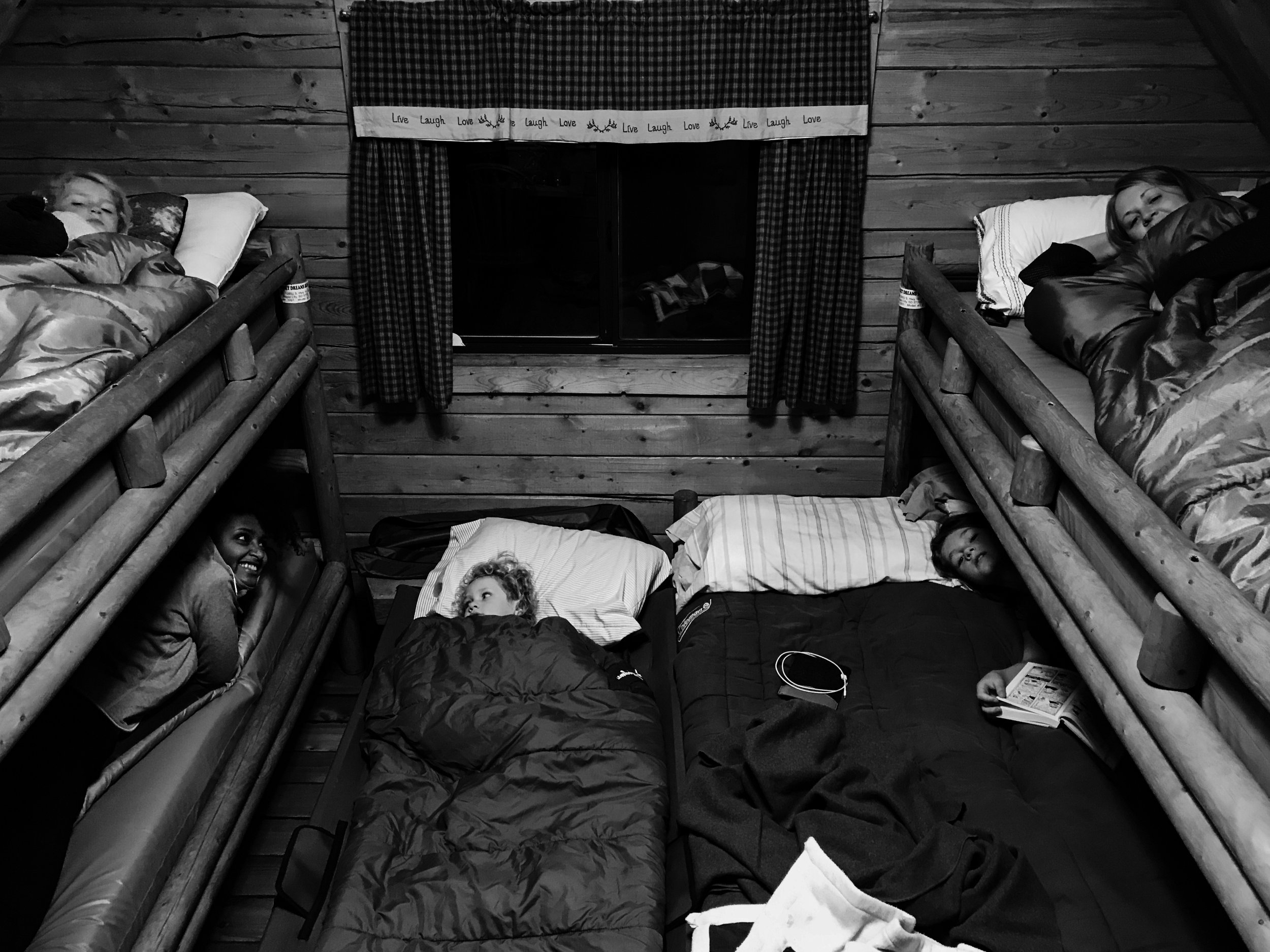Eleven years ago, one of the best friends a boy could have passed away. From about 2nd grade to 8th or 9th grade, Ron and I were brothers. I've even written about his mom before because every boy should have a second mom like her - she is one of the best.
When Ron and I entered high school, we went our separate ways. We were always friendly and enjoyed reuniting at parties or games or wherever else life crossed our paths, but we grew distant enough that when he passed, I didn't know about it, and wouldn't, until almost six years later.
The night I found out Ron had passed I remember needing to discipline my son, who was five at the time, but every time I sat him down to talk, I saw Ron, and I just couldn't do it. I ended up holding my son and crying, thinking of the friend I used to ride bikes with, play basketball with, steal chain nets from the nearby park with, trick-or-treat with, and build endless forts and fires with. He was a good friend. And suddenly, I really missed him.
Recently, to try and honor and remember him, I've thought of writing short stories, every October, that bring out the spirit and character of Ron and our friendship. This is the first of those stories.
We were not perfect friends and we were not perfect to our neighbors, but looking back, I do believe our friendship was perfect. And I hope both my boys will someday be as fortunate to have Ron in their lives.
"In the endless war against weakness and despair, {stories} are the bright rally-flags of hope and of emulation." - John Steinbeck
On How to Build a Fort
My dad always told me that when things break, they grow back stronger. My science teacher disagrees. She says that’s a “misconception” and that when something is broken, whatever comes after is still broken, but I don’t think so because, if it were true, Ronnie’s fingers wouldn’t have healed and he wouldn’t be my best friend.
How it happened was like this. We were building a fort with some old wood we’d found in the small forest behind my backyard. The wood was dirty and warped and stained with rain and sun, but we didn’t mind because there was enough to build dreams and we had all day to do it. We just needed a few of my dad’s tools.
For the most part, my dad is pretty relaxed with me borrowing his things because he’d rather me be outside than watching TV or playing videogames. His only rule is that I put everything back where it came from. I’ve learned, over the years to not break or bend or come close to forgetting this rule because the consequences are severe.
Ronnie, however, doesn’t really understand my dad or his rules so he isn’t afraid to get more tools or rakes or things we don’t need but look fun but are easily forgotten. When I say no, he gets mad and threatens to leave.
As much as Ronnie is fun and laughs and knows how to make almost everything better, he also has a slight temper. Especially when he’s wrong about something he thinks he’s right about. Like the time we were fishing in the small pond near his house and he thought he could catch a bullfrog with a bobber. I told him it wouldn’t work but he didn’t believe me and spent most of his time trying and cursing. When I started catching them with my net, he started complaining that my bobbers weren’t the right size and that’s why he wasn’t catching them. When I told him he’s just too dumb to catch bullfrogs he threw down the fishing pole, my fishing pole, and stomped off, leaving his bobber bobbing up and down, silently, like a bobber should. Until the biggest bullfrog I’d ever seen gulped it down, but Ronnie was too far away and I never told him about it.
See what I mean though? A temper.
And I can always tell when Ronnie’s starting to get upset because he starts saying things that are completely unrelated to what we’re doing. Like when I told him he wasn’t building the fort correctly, that we should be using the wood to cover the walls first, so people couldn’t see in, he started talking about his other friend Jake and how he was going to take him camping instead of me.
I pretended not to care and went to get more nails from the garage, and that’s when I found the hatchet. It was an older hatchet with a smooth handle and a couple of nails pounded into the top to keep the blade from flying off. The tip of the blade had a few small knicks in it, like it had been beaten against the side of a nail or something, but I didn’t care, I just knew we needed it. So I fit the handle inside my belt loop, grabbed a handful of nails, and headed back to Ronnie and our fort, the handle of the hatchet dangling down and knocking my knee.
When I got to the fort, Ronnie was tearing bark of a nearby tree – the roof of the fort had collapsed, just like I knew it would.
“What happened?” I asked.
“You didn’t build the walls strong enough,” he said, tearing off a large piece of bark and throwing it at the fort.
“Stop doing that,” I said, dropping the nails and pulling out the hatchet, “My dad hates it when we damage the trees.”
Ronnie pulled off another piece then walked over to the fort.
“I told you,” I said moving a few pieces of wood with the hatchet, “we need to build stronger walls before working on the roof.”
“If we don’t have a roof then everything we put inside will get wet,” Ronnie argued, and I could see him eyeing my hatchet.
“I know,” I argued, holding up the hatchet and inspecting the blade, “but we need stronger walls first.” I put the hatchet back into my belt loop and picked up one of the larger pieces of scrap wood, “Get the other end,” I said, nodding.
Ronnie threw the piece of bark at me, missed, then picked up the other end, “Where’d you get that hatchet?” We set the wood across the three 2x4s that were sticking up from the ground, “Hold this,” I responded.
Ronnie walked over, “Let me do it,” he said, reaching for the hatchet.
“Hold on, let me do this one first.” I turned the hatchet backward and used it like a hammer, the way my dad does when we’re camping and he can’t find his hammer.
The two nails went in quickly. “My turn,” Ronnie said, again reaching for the hatchet.
“Hold on, let me check something real quick,” I inspected the wood, its sturdiness, its quality, and other things that take time, a trained eye, and a hatchet.
“Brian,” Ronnie said, “just give me the hatchet. You don’t need it for that.”
“One minute,” I said, making my final inspections, “okay – good,” finally handing it over.
He grabbed it, “Hold this for me.” And I did
Ronnie and I have built dozens of forts over the years and every time we do, without exception, someone gets hurt. Sometimes both of us do. Like the time we uncovered a bee’s nest and we each got stung three times. Ronnie blamed me because I hit the nest with a stick, but that’s not true. When I told him so, and that he didn’t know anything about bees and nests and how to get rid of them, he started throwing small rocks at me until we couldn’t take the bee stings anymore and had to run to Jake’s house to see if we could swim in his pool.
So, it was inevitable that after giving Ronnie the hatchet and watching him pound in a few nails, someone would get hurt.
“Okay,” I said, “give it back. I need it for something.”
“I’m not done yet,” he said, looking through the pile of warped and rotting wood.
“Ronnie, it’s mine, give it to me,” I said, reaching for it.
He held it back and kept looking for something, but I think he was just stalling.
“Ronnie,” I yelled, “Give it back, it’s mine!”
He turned, “I was going to change my mind and take you camping instead of Jake, but now I’m not.”
“I don’t care!” I said even though I did,” Take ‘em. Just give me the hatchet!” and I reached again for it.
“You’re a dick!” Ronnie yelled and threw the hatchet toward the little ditch that ran alongside our yard. It wasn’t very deep, but it was muddy.
“What are you doing!” I yelled, pushing him in the chest, “That’s my dads!”
Ronnie stumbled back a bit then rushed at me because he’s a fighter. I’m not. Even though I’m taller and a bit stronger than most of my friends, I’ve never been in a fight. Ever. But Ronnie has, several times, “because sometimes, you have to,” he says, but I didn’t really know what that meant.
So when Ronnie picked up a stick and started swinging, I picked one up too, to defend myself. But Ronnie wasn’t defending, he was swinging and swinging, like warriors do in those old movies, and I was scared because my hands started to sting and Ronnie was getting closer and closer.
Then, suddenly, after a really hard swing, Ronnie’s stick broke. The shattered piece twisted around and smacked me on the shoulder, stinging more than the bee stings combined, but it didn’t matter because now I had the bigger stick; the piece left in Ronnie’s hands wasn’t much bigger than the hatchet.
So he threw it at me, and missed. But I didn’t. When I swung, I hit him square on his hand, and the crack sounded like the breaking of a stick.
Instantly, Ronnie started yelling and screaming and crying. I’d never seen Ronnie cry before so I didn’t know what to do but get my mom. She checked his fingers, put ice on them, then sent him home and I was left to clean up the fort and search for the hatchet. By the time I found it, my dad was home, Ronnie’s finger was broken, and I wished I hadn’t I hit him.
“How’s the fort?” my dad asked, “Okay,” I said. “It keeps falling down.”
“It’s because you didn’t build the walls strong enough,” he said, then showed me how.
I didn’t talk to Ronnie for almost three days but it should have been a whole week. My mom said we needed a break from each other so I asked if I could go for a bike ride instead. When I rode past his house, Ronnie was in the front yard, and he was wearing a cast.
“Holy crap!” I said, riding over, “how long do you have to wear that?”
“Just a few weeks,” he said, and he was smiling. We both laughed.
“Does it hurt?” I asked.
“No, it just itches.” He turned his hand over, like we were both inspecting it for further breaks, “I’ve already lost two pen caps inside,” he said.
We both laughed again and the new kid came crawling out from behind the bushes that line Ronnie’s house, “What’s so funny?” he asked, holding a football.
Ronnie ignored the question, “Wanna play?” he asked.
“Sure,” and I set my bike against the tree, “here” I said, holding out my hands and jogging away from the new kid. His pass fell about three feet short and several yards behind me.
Ronnie laughed. So did I, and I couldn’t stop. I ran over, picked up the football, threw it to Ronnie who tried catching it with his one good hand but dropped it quickly, and we laughed a little harder.
When Ronnie threw it to the new kid, it slipped through his hands and hit him right on the forehead and I fell down laughing. I could hear Ronnie’s high pitched laugh, the one that comes out only when he’s losing control, and it made me feel good. I laughed even harder.
The new kid didn’t seem to get it though.
He’d moved in about a week prior and lived just down the street, and he had an older sister. When they first moved in, we tried to find the window to her bedroom, but never did.
The new kid tried once more to throw a pass but I didn’t even try running after it, “What the hell man,” I yelled, the ball bouncing awkwardly a few times in the grass, “Next time we’re gonna invite your sister.”
I heard the footsteps coming before I saw him, but not in time. When I looked up, the new kid was already there and he ran into me like a wrecking ball and I landed on my back, the wind knocked out of me. I tried to breath, but I couldn’t, and the new kid stood above me, tears in his eyes and lower lip quivering.
Ronnie came flying out of nowhere and jumped on the kid’s back, cast and all, and they both stumbled forward. But the new kid was big and mean and he threw Ronnie off. Ronnie ran and the new kid chased after him.
When my breath finally came back, I ran after them both. Ronnie turned at the street, which gave me a side shot at the new kid, but he saw me coming and sidestepped then pushed me so hard I almost fell again. But I didn’t. Instead, I shoved him back.
I was ready for my first fight, because I had to, because Ronnie is my friend.
The new kid put up his fists.
I didn't know what to do, so I stood there and Ronnie came back and stood next to me, and we stood there, together, as the new kid held up his fists and fought back tears. He looked from me to Ronnie then back to me, his fists up and ready.
“Hey!” Ronnie’s mom yelled from the front door, “You knock that off!”
We turned. She was standing halfway out the front door, one foot outside and one foot in, “Ronnie, I think your friends need to go home. It’s dinner time!”
We looked back at the new kid who glared at us both for a bit then turned and ran home.
Ronnie and I looked at each other, “You wanna stay for dinner?” he asked.
“Sure,” and we turned toward the house, “but first I gotta call my parents.”
Ronnie’s mom looked up from the stove, “I thought I said your friends needed to go home?’
Ronnie and I looked at one another, “But -” and he looked from me to his mom and she looked at me, “Okay. But the other kid is gone?”
“Yes,” Ronnie said, and I picked up the phone to call home.
After dinner, I signed Ronnie’s cast and wrote, “Sorry.” Ronnie said he was too and within a week, his cast we off.
We never saw the new kid again, or his sister, because his family moved away a few days later. But we did finish the fort, and when we went back, after the long and brutal winter, it was still there. So we built a different fort. And this time, no one got hurt.
In memory of my loyal and forgiving friend, Ron Hardy.
Thank you for reading.












































